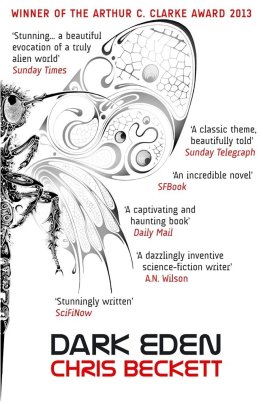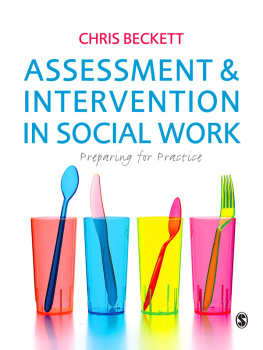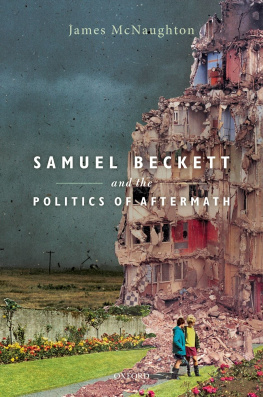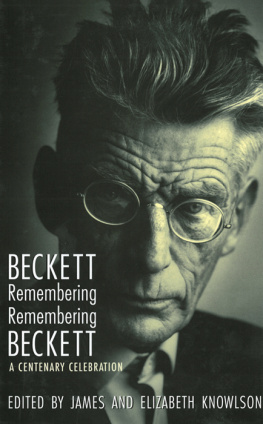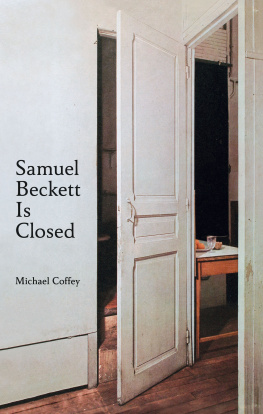Ackerley Chris - Beckett/ Philosophy
Here you can read online Ackerley Chris - Beckett/ Philosophy full text of the book (entire story) in english for free. Download pdf and epub, get meaning, cover and reviews about this ebook. City: Stuttgart, year: 2015, publisher: ibidem-Verlag Jessica Haunschild;Christian Schon GbR, genre: Detective and thriller. Description of the work, (preface) as well as reviews are available. Best literature library LitArk.com created for fans of good reading and offers a wide selection of genres:
Romance novel
Science fiction
Adventure
Detective
Science
History
Home and family
Prose
Art
Politics
Computer
Non-fiction
Religion
Business
Children
Humor
Choose a favorite category and find really read worthwhile books. Enjoy immersion in the world of imagination, feel the emotions of the characters or learn something new for yourself, make an fascinating discovery.

- Book:Beckett/ Philosophy
- Author:
- Publisher:ibidem-Verlag Jessica Haunschild;Christian Schon GbR
- Genre:
- Year:2015
- City:Stuttgart
- Rating:4 / 5
- Favourites:Add to favourites
- Your mark:
- 80
- 1
- 2
- 3
- 4
- 5
Beckett/ Philosophy: summary, description and annotation
We offer to read an annotation, description, summary or preface (depends on what the author of the book "Beckett/ Philosophy" wrote himself). If you haven't found the necessary information about the book — write in the comments, we will try to find it.
Beckett/ Philosophy — read online for free the complete book (whole text) full work
Below is the text of the book, divided by pages. System saving the place of the last page read, allows you to conveniently read the book "Beckett/ Philosophy" online for free, without having to search again every time where you left off. Put a bookmark, and you can go to the page where you finished reading at any time.
Font size:
Interval:
Bookmark:
In memoriam
Sean Lawlor (1948 2011)
The day that is darkest
Is the day without laughter
(Nicolas-Sbastien de Chamfort
via Samuel Becketts Long After Chamfort, trans. Sean Lawlor )
Acknowledgments
The editors would like to thank, first and foremost, Alexander Gungov for his unflagging support of this project from initial appearance in the Sofia Philosophical Review V/1 (2011) to his encou r agment and assistance with an extended version, published via the kind offices of Sofia University Press under the title Bec k ett/Philosophy (2012). We would also like to gratefully acknowledge the assistance of David Addyman and Tania Mhlberger for their pivotal assistance in final preparations of this text for press, as well as to all invited contributors for their goodwill and forbearance in the process of publication. The editors would also like to thank Christian Schn, Valerie Lange and their colleagues at ibidem Press for co m mitted and enthuiasistic support in the re-publication of this volume.
Excerpts from Samuel Becketts unpublished Whoroscope Notebooks; Human Wishes Notebooks; Philosophy Notes and Interwar Notes; and letters to Mary Hutchinson and to Barbary Bray, all The Estate of Samuel Beckett, reproduced by kind pe r mission of the Estate of Samuel Beckett c/o Rosica Colin Limited, London.
Alexander L. Gungov (Sofia University and Sofia Philosophical Review)
In Becketts enigmatically appealing universe, a philosophical touch shows through, born of imagina ry conversations and indirect disputes with philosophers. The authors in this volume have studie d in depth the philosophical sources of the Irish sage s oeuvre , revea l ing his responses to the love of wisdom from various angles. The ed i tors, Matthew Feldman and Karim Mamdani , have demonstrated the uniqueness of the contributions and their significance for the field, so they have released me from this duty. What I wish to do is to try to hear and share some notes from the philosophical sonority of Bec k etts work amid the current human predicament.
Hope is ever more and more lacking today. Becketts writings call for hope in spite of or due to their seeming obscurity and unca n niness edged with absurdity. His first publication on Joyces Work in Progress had seminal impact on his later development . As Donald Phillip Verene point s out in his essay included in this volume, Bec k ett did not pay special attention to the humorous aspect of Joyces style. Nevertheless, he absorbed it s influence, often deflecting it in to ironic twists. Irony is Vicos fourth trop e , which, unlike metaphor, is not a part of the poetic language of the heroic age but rather dom i nates in the following mediocre age , which is focused on attending to ones mundane concerns . For the twentieth and twenty-first centuries , however, irony is too week a tool ; even satire proves short of vigor in coping with its unprecedented reality. The mode that matches the e x traordinary demands of the present is the grotesque, which fully captures the world falling apart , masterfully conveying its innermost e s sence of decay.
Yet Becketts grotesques are not just images of decline and d e struction. The speculative impetus of Benedetto Croces Vico has passed into Becketts dealing with the plain nonsense of ambient life. The paradoxically productive impasses Beckett comes close to the Kantian/Lyotardian sublime in which the imagination is engaged in the impossible effort to provide visibility to an Idea . The successful conclusion of this hopeless task is only a lure ; the real goal is the endless strife. Lyotards differend an assignment that , by de f inition, cannot be fulfilled recalls the same situation but without the majestic delusion common to the sublime.
The s peculative tendency in Beckett aiming at a new reality via a regenerated sense goes beyond the noble impotence of the sublime and the doomed differend . It assists us not only to re cognize the mar i onette theater of our contemporary age which is not its worst mi s fortune but to face soberly the transformation of human beings into statistical units. The o verwhelming ontology of statistics is opposed by an autonomous grace in a frozen figure, a trembling tension, once again, between philosophy and image. The irreplaceability of h u man warmth is awareness yet to come ; but a piece of good news has already been announced , and it is my ardent wish that Bec k ett/Philosophy , now in ibidem Press edition , spread s it against the dominating hyperreality of financial ledgers and statistical reports.
Karim Mamdani, Conclusion: Beckett in Theses, in this volume, 389.
Ibid., 391.
Ibid., 390.
I s This the Right Time to Ponder Beckett and Philosophy?
Alexander L. Gungov ( Sofia University , Bu l garia )
Why Bulgaria, and why Sofia University Press? What does Bu l garia have to do with philosophy, let alone with Beckett? The only Bulgar i an philosopher renowned worldwide, St. Cyril, dates from the ninth century (fortunately A.D.) and the only prominent contemporary philos o pher with a Bulgarian name, Julia Kristeva, happens to be French. Bulgaria a Wonderland where people shake their heads to say No and nod to say Yes , where the King de jure becomes the Prime Minister de facto ; a low-budget deficit state where the princ i pal qualification for one to be appointed Finance Minister (dedicated to fighting the soaring foreign debt) is that persons foreign citize n ship, and whose most substantial element of national security is a doner kebab shop shield. In spite of, or perhaps because of this, Sa m uel Beckett is prominent in the academic circles of this country and enjoys a following among the wider reading/theatergoing public. turned out to be a gesture prophetic of the later warm welcome of the Irish writer in Bulgaria and in the whole of Central and Eastern E u rope .
During real socialism a time when nothing exciting would or could happen in this country and in the other fraternal Warsaw Pact n a tions Waiting for Godot seemed to speak directly to socialist laborers. Now, in the post-totalitarian transition period, the entire Beckettian oeuvre seems perfectly tailored to all sorts of job market players, still crying (and therefore living) retirees, mute (but neverth e less also alive) totally independent drug addicts and prostitutes, downsized former employees, the newly homeless freed from the oppressive state and Communist Party tutelage, not forgetting the opt i mistic army of tomorrows une m ployed alumni and their worshipping scholarship professors.
As the present collection of essays shows, there are many a s pects and many senses of the relationship between Beckett and ph i losophy. Indeed, Becketts writings are permeated by the intellectual mood of their time but they also seem to foresee a bleak human dest i ny. Beckett was, of course, a witness to many of the major events of the twentieth cent u ry, including both the end of the Cold War (unique in the annals of warfare in that no official winners were declared and no casualties counted) and the birth of the post-1989 New World Di s order. Beckett passed away on December 22, 1989, on the final day of the so-called Romanian Revolution the only bloody event in the velvet Central and Eastern European autumn; just three days before the Ceauescu couples trial and execution itself seemingly staged according to a script by another giant of the theater of the absurd, Romanian-born Eugne Ionesco .
The eagerly hoped-for, radiant happiness of utopia, which was scientifically predicted to las t ad infinitum with the end of history, turned out to be an ongoing disaster to him who has nothing it is forbidden not to relish filth shared by the civic electorates (devoted civil co n sumers) on both sides of what once was the Iron Curtain. The metal of this awe-inspiring partition was symbolically melted in a truly Becke t tian mode to produce a rather palpable income. Business-minded citizens of undisclosed ethnic origin, who had broken for good with the oppressive totalitarian past, started collecting various metal items for scrap purposes throughout the liberated former Co m munist Bloc and in Bulgaria in particular. National electric grid cables, sewage manhole covers, streetcar/train rails and bronze memor i als of different sizes and shapes went to scrap; no surprise, then, that some entrepreneurs had to be taken care of by hospitals and the last ri te s /rights institutions. These endeavors accompanying the acquis i tion of semi-miraculous skills became emblematic of the New E u rope: receiving a wage in the hundreds but facing bills in the tho u sands; being paid only quarterly or biannually; coping with laws changing on a weekly basis, etc. all of this turned out to be quite contagious for the rest of Europe. An eloquent illustration of this pe s tilent ial tendency occurred just a moment ago, as I was writing this Foreword: Henry Moores 500,000 Sundial has been stolen from the authors estate-museum. It was reported that the robbery was made not to fence the sculpture on the black market (as hardly anybody could instantly command such a price) but simply to sell it for scrap the copper in the bronze is estimated to fetch 1,500. More o ver, the news provided no details about the suspects being New E u ropes free citizens and not Her Royal Majestys own subjects.
Font size:
Interval:
Bookmark:
Similar books «Beckett/ Philosophy»
Look at similar books to Beckett/ Philosophy. We have selected literature similar in name and meaning in the hope of providing readers with more options to find new, interesting, not yet read works.
Discussion, reviews of the book Beckett/ Philosophy and just readers' own opinions. Leave your comments, write what you think about the work, its meaning or the main characters. Specify what exactly you liked and what you didn't like, and why you think so.

